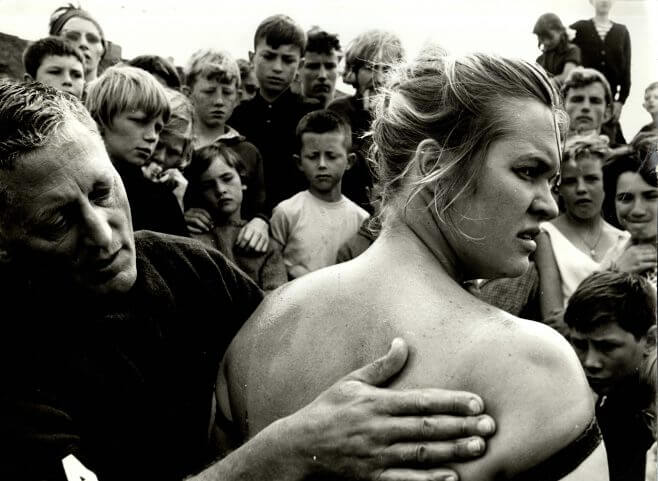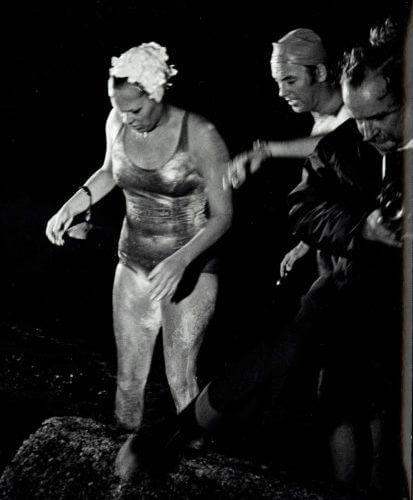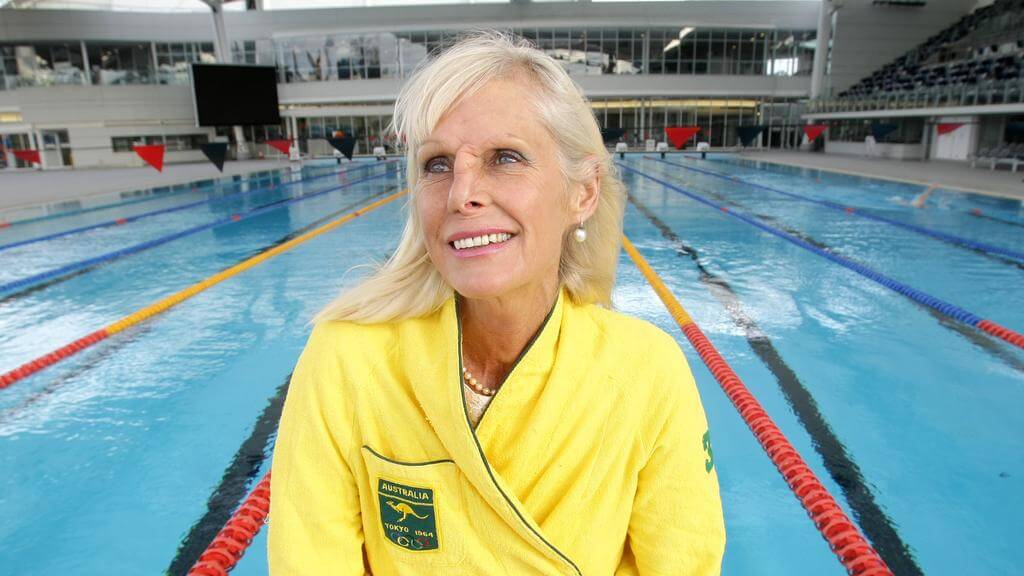Tokyo Olympian and English Channel Conqueror Linda McGill Dies On the Gold Coast at 79
Australian Olympian, Commonwealth Games gold medalist and international marathon swimmer extraordinaire Linda McGill has died on the Queensland Gold Coast, at the age of 79. McGill passed away on Wednesday afternoon at Robina Hospital after a battle with emphysema, a chronic lung condition.
Former teammate and Olympic legend Dawn Fraser remembered McGill as “a good friend, loyal team member, an amazing human, champion swimmer in the pool and the open water” who contributed so much in a life well lived.
COMMONWEALTH GAMES GOLD: Australia’s 4x100m medley relay, Perth Commonwealth Games 1962 (L-R) Pam Sergeant, Marguerite Ruygrok Dawn Fraser, Linda McGill. Photo Courtesy News Limited
Fraser arranged for the Olympic Committee to present McGill’s family with an Olympic flag, which they are thrilled about.
McGill will be remembered as a larger-than-life achiever, once banned by Swimming Australia along with Fraser, before becoming the first Australian to swim the English Channel, doing so in 11 hours 12 minutes in 1965.
The striking, broad-shouldered blonde decided to tour Britain and Europe with fellow Australian Olympic swimmers Ruth Everuss and Ilsa Konrads.
Until then, she had given no thought to swimming the Channel. “I had no idea at all about Channel swimming until I decided to leave Australia after being banned,” she said.
“It was only when I reached London that such a swim was suggested. To be honest, I had never even heard of Channel swimming.”
McGill was remembered in England as a friendly, tall, blonde, blue-eyed London City barmaid with a daunting “Junoesque” build before her Channel swim.
She left Dover in a launch with Konrads and Everuss, on the morning of August 6.
“She’ll be right, sport,” was the parting shout of the banned Australian Olympic swimmer, as she set out to become the first Australian to swim the Channel the next day, on August 7, 1965.
French schoolchildren thronged around as she stepped into the water, coated in lanolin, at 4 p.m. Diarrhea and sickness started three kilometers offshore. Her team administered hot kangaroo-tail soup from a pole which she could not touch for fear of disqualification.
At one point McGill began to drink seawater, and recalled it tasted “marvelous.”
Six hours from Dover, Konrads – a gold medalist and world record holder in her own right – dived from the escort boat to keep McGill company but quit with seasickness after an hour.

Linda McGill of Australia with crowds of children watching her being ‘greased up’ by Peter Frayne, Channel Swimming Association Observer and Committee Member. Photo Courtesy English Channel Swimming Association.
“I can’t believe it,” McGill gasped, managing a smile when she was helped ashore at Dover at 2:45 a.m. on August 7.
In 1967, she again swam the Channel, twice, once topless. Disappointed with her first swim, she completed a follow-up swim and set a women’s record of 9 hours 59 minutes, a time that came close to beating the then men’s record of 9 hours 35 minutes.
It would be the start of an extraordinary open water swimming career where she conquered the world of marathon swimming, and was presented with an MBE.
McGill faced a variety of obstacles throughout her storied life before triumphs came in bunches, surviving her mother’s tragic death, and coming back after that scandalous ban from the 1964 Tokyo Olympics after attending the Opening Ceremony – defying an edict that swimmers were to stay in the Village.
She also survived a near-fatal car accident and a devastating divorce.
Her autobiography, Surviving the Sea of Life: The Triumphs and Tragedies of an Australian Olympian, tells of her repeated victories against fate and roadblocks.
McGill wrote about her world travels, meeting the rich and famous, sports stars, film stars, and politicians while dealing with her constant battle with skin cancer.
Inducted into the International Marathon Swimming Hall of Fame as an Honour Swimmer, McGill would also become the first person to swim across Port Phillip Bay in Victoria, Australia when she swam 25 miles from Portarlington to Frankston. She was also the first person to swim around Hong Kong Island, and from Townsville to Magnetic Island in Queensland.
At the Commonwealth Games in Perth, she took home three medals: gold in the 400m medley relay, with Pam Sergeant, Marguerite Ruygrok and Fraser, silver in the 400m individual medley and bronze in the 100m butterfly.
McGill also hit the headlines for swimming topless to reduce drag in the water.

Linda McGill becomes the first Australian to conquer the English Channel. Photo Courtesy English Channel Swimming Association
On New Year’s Day in 1968, she became the youngest Australian to become a Member of the Order of the British Empire (MBE).
McGill was also inducted into the International Marathon Swimming Hall of Fame in 1968 and was in the inaugural class of inductees into the Australian Marathon Swimming Hall of Fame in 2020.
In her later years, McGill continued ocean swimming at Broadbeach while living on the Gold Coast. She auctioned off her entire collection of swimming medals and memorabilia to charity in 2007.
In March 1965, McGill was one of four swimmers hit with the ASU ban, ridiculed as a “laughing stock” around the world.
The ban destroyed the Olympic prospects of Fraser, 27, banned for 10 years after winning her third 100m freestyle in a row; 200m breaststroke and medley swimmer McGill; 400m freestyler Nanette Duncan, 17, and 400m freestyle champion Marlene Dayman, 15, banned for three years.
“I was in Tokyo … and never heard a word about misbehaviour. It took … a lot of money and sacrifices to get Linda to the top. Now these officials have torn it all away in five minutes,” her father, Burwood police sergeant Malcolm McGill, said at the time.
Born on December 17, 1945, McGill grew up in the Sydney suburb of Abbotsford, on Hen and Chicken Bay.
“She used to swim there as a kid,” her father Malcolm explained the day after McGill’s Channel swim. “I helped her train four hours a day since she was 10 years old.”
Close friend George Christofides told the Gold Coast Bulletin Linda McGill was an “amazing human” with a “good soul.”
Linda McGill’s Swimming Career Highlights:
- At age 9, she won freestyle and breaststroke events at all district carnivals and was spotted by Olympic coach Frank Guthrie in Sydney. With Guthrie, she won all her trials, set a breaststroke record and began swimming butterfly.
- By age 13, Linda won seven age group NSW State championships and was selected for the National competition, finishing second in her event.
- In 1958, Linda joined the great Forbes Carlile‘s squad, then in 1960 linked with another legendary coach Don Talbot, who she remained close with for many years
- At the 1961 Australian Swimming Championship in Brisbane, the 15-year-old won the Open National title.
- In 1962 at the National championships, she won the 440 yards IM and 110 yards butterfly and was second in the 220 yards breaststroke.
- She was selected for the Perth Commonwealth Games squad and McGill, Dawn Fraser, Marguerithe Ruygrok and Pam Sargeant won the 4×100 medley relay in world record time at an exhibition swim two days before the Games.
- At the Games, she won bronze in the 110 yards butterfly, silver in the 220 yard IM and gold in the medley relay.
- In 1964, she won five National titles in three days – a women’s record at the time, taking out the 100 and 200m butterfly and 200 and 400 IM and 200m breaststroke. The butterfly and medley times were Australian records and selection for the 1964 Tokyo Olympic Games was automatic.
- McGill, along with Fraser, was banned by the Amateur Swimming Union of Australia as punishment for defying a ban on attending the opening ceremony at the 1964 Tokyo Olympic Games where she swam four events: 200m breaststroke, 100m butterfly, 400 IM (finishing fifth in an Australian record) and 4x100m medley relay.
- In August 1965, she completed her first English Channel swim, the first Australian to do so.
- In July 1967, she swam Sydney Harbour,
- In September 1967, she completed her second English Channel swim and four weeks after, the third and record-breaking English Channel swim, a new women’s record. This stood for eight years.
- On New Year’s Day 1968, she received the MBE, then the youngest Australian recipient.
- In January 1968, Linda won the Port Phillip Bay crossing, the first person to do so.
- In 1968, she swam from Capri to Naples; in Canada she swam Lake Ontario, lac St John and Lake Simone and in the US, Block Island to Rhode Island.
- In 1968, she swam from Brisbane to Moreton Island and Townsville to Magnetic Island swims.
- In 1972, she swam around Hong Kong.
- In 1977, she swam from Saudi Arabia to Bahrain and in Rabaul, New Guinea.
- Between 1983 and 1986, she swam three times in the Manhattan Island Swim, and became the first Australian to swim around Manhattan Island in 1983.
- In 1989, she competed in the World Masters Games in Rio de Janeiro.
- On August 4, 1968, she competed in the Traversee Interntionale du la St-Jean in Quebec, Canada, completing the swim in 12 hours 2 minutes 44 seconds at the age of 22.
- On May 24, 1976, she became the first person to swim 28 miles (45 km) around Hong Kong Island in 16 hours 6 minutes at the age of 29.
- In 1977, she became the first person to swim across the Arabian Gulf non-stop at the age of 32 and she was the first person to swim from Townsville to Magnetic Island, Queensland, Australia in a shark cage.
